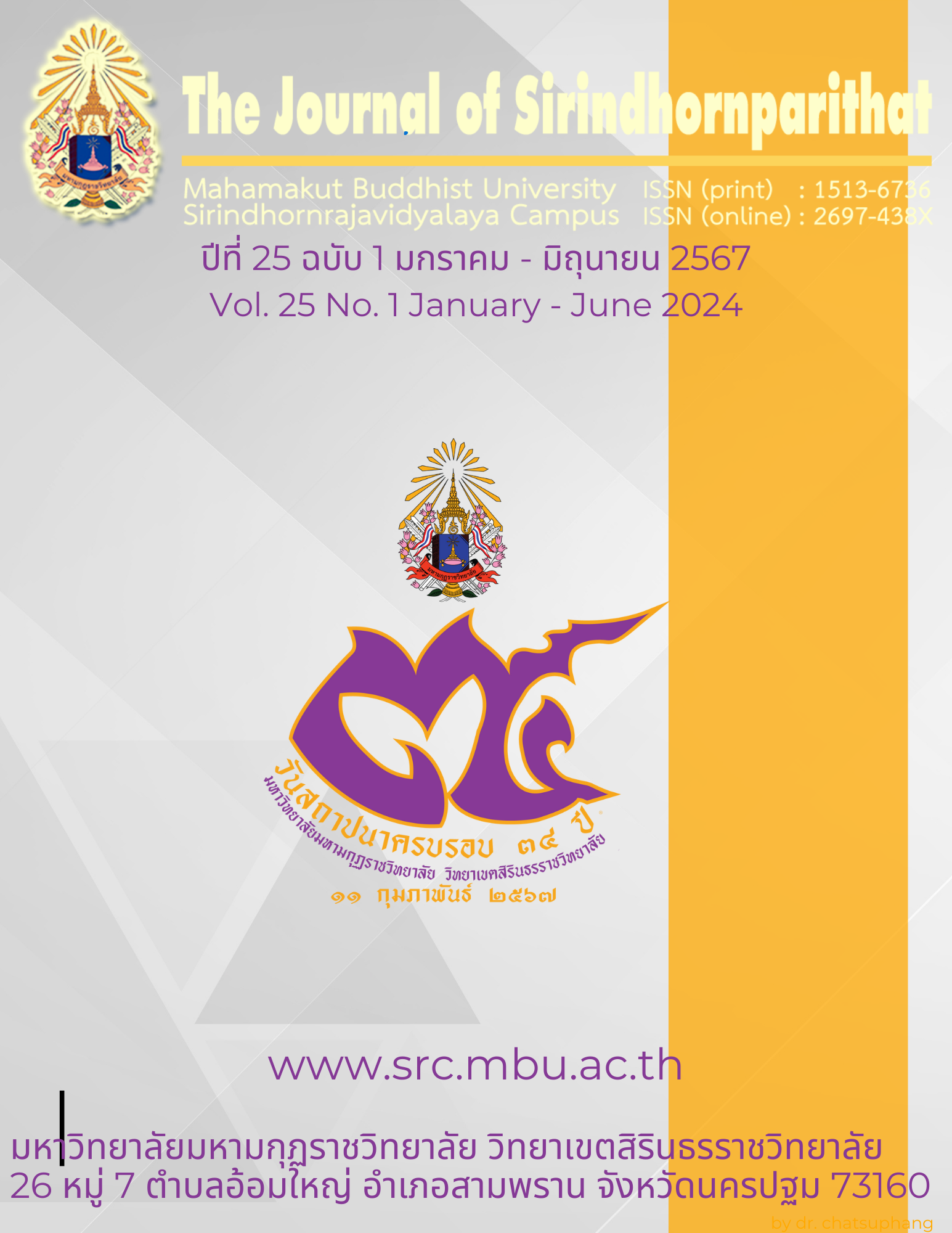Participation in Educational Management of Teachers in Developing Children with Intellectual Disability at Prachuap Khiri Khan Special Education Center
Keywords:
Participation, children with intellectual disability, language proficiency, conceptual thinkingAbstract
Teachers’ participation in educational management is important for developing children with intellectual disability because teachers closely take care of children, knowing children's learning problems the most. The objectives of this research were to study: 1) teachers' participation in educational management in developing children with intellectual disability at Prachuap Khiri Khan Special Education Center, and 2) the outcomes on developing children with intellectual disability at Prachuap Khiri Khan Provincial Special Education Center. The samples for this study, selected by purposive sampling method, were seven teachers taking care of children with intellectual disability, and eight children with intellectual disability at Prachuap Khiri Khan Special Education Center, 10-13 years of age, with developmental level at 3 years 6 months and Intelligence Quotient (IQ) at 75. The research tools were the individual lesson plans, 2 sets of 10 items of intellectual development assessment, a questionnaire, an interview form, and a focus group discussion. The quantitative data were analyzed by using mean, standard deviation, and t-test, and content analysis was used for analyzing qualitative data.
The research results were as follows:
- The teacher’s participation in educational management in developing children with intellectual disability at Prachuap Khiri Khan Special Education Center consisted of 4 steps: 1) Participation in thinking, studying, and researching, was overall at a high level. The researcher and the teachers joining a group discussion and responding the interview, had got knowledge on teaching techniques, measurement and evaluation method, individual lesson plan preparation, and development on intelligence, language proficiency, and conceptual thinking ability, 2) Participation in planning, and setting policy and activities was at a high level. The teachers attended a group discussion, preparing 16 individual lesson plans: 8 teaching plans for language development, and 8 conceptual thinking plans, 3) Participation in decision-making and practice steps was at a high level. The teachers and researchers taught according to the components of the individual lesson plans for children with intellectual disability at Prachuap Khiri Khan Special Education Center, and 4) Participation in controlling, monitoring, and evaluating steps was overall at a high level. The teachers applied teaching plans, teaching activities, and research results in evaluating the development, participating in internal supervision, and measuring and evaluating the participation.
- The development outcomes revealed that language proficiency and conceptual thinking ability of children with intellectual disability after learning were higher than those before with statistical significance at the 0.05 level
The research finding revealed that participatory process was important for teaching and learning management for children with intellectual disability by teaching according to the individual lesson plans having been set together. The teachers should, therefore, take participation seriously in educational management in order to cooperatively brainstorm, propose problems, propose solutions, and systematically implement together in schools.
References
กิตติศักดิ์ อังคะนาวิน. (2563). รูปแบบการนิเทศภายในสถานศึกษาสังกัดสำนักงานเขตพื้นที่การศึกษาประถมศึกษาชลบุรี เขต1. คณะศึกษาศาสตร์ มหาวิทยาลัยศรีนครินทรวิโรฒ.
กนกอร บุญกว้าง และ จิณณวัตร ปะโคทัง. (2558). การมีส่วนร่วมการจัดการศึกษาของชุมชน กรณีศึกษา : โรงเรียนบ้านเหมือดขาว สังกัดสำนักงานเขตพื้นที่การศึกษาประถมศึกษายโสธร เขต 1. ปริญญาการศึกษามหาบัณฑิต มหาวิทยาลัยราชภัฏอุบลราชธานี.
ธัชพงศ์ มีแก้ว. (2557). การบริหารแบบมีส่วนร่วมของโรงเรียนในกลุ่มลำเหย อำเภอดอนตูม สำนักงานเขตพื้นที่การศึกษาประถมศึกษานครปฐม เขต 1. วิทยานิพนธ์ศึกษาศาสตรมหาบัณฑิต (การบริหารการศึกษา) มหาวิทยาลัยศิลปากร.
ปรีชา กากิ. (2554). การมีส่วนร่วมของชุมชนในการจัดการศึกษาของโรงเรียนสังกัดเทศบาลนครยะลา.กรุงเทพมหานคร : มหาวิทยาลัยราชภัฏสวนดุสิต.
พรศิริ ศิริเรศ. (2560). การพัฒนาชุดกิจกรรมเพื่อส่งเสริมความสามารถการอ่านคำศัพท์ภาษาอังกฤษของนักเรียนที่มีความต้องการพิเศษ โดยใช้เทคนิค Picture Me Reading. ศึกษาศาสตรมหาบัณฑิต สาขาหลักสูตรและการสอน วิทยาลัยครุศาสตร์ มหาวิทยาลัยธุรกิจบัณฑิตย์.
พาตีฮะห์ เดเบาะ. (2562). การมีส่วนร่วมของครูในการบริหารสถานศึกษาสังกัดสำนักงานเขตพื้นที่การศึกษาประถมศึกษายะลา เขต 3. ปริญญาศึกษาศาสตรมหาบัณฑิตสาขาวิชาการบริหารการศึกษา มหาวิทยาลัยหาดใหญ่.
พัชรา เชื้อประดิษฐ์. (2556). แนวทางส่งเสริมการมีส่วนร่วมของบุคลากรที่เกี่ยวข้องในการจัดการศึกษาแบบเรียนร่วมในโรงเรียนแกนนำจัดการเรียนร่วม สำนักงานเขตพื้นที่การศึกษาประถมศึกษาสุโขทัย เขต 1. สาขาวิชาการศึกษาพิเศษ คณะครุศาสตร์ มหาวิทยาลัยราชภัฏพิบูลสงคราม.
เมตต์ เมตต์การุณ์จิต. (2553). การบริหารจัดการศึกษาแบบมีส่วนร่วม : ประชาชน องค์กรปกครองส่วนท้องถิ่นและราชการ. กรุงเทพมหานคร : พอยท์.
วันชัย วัฒนศัพท์และคณะ. (2551). คู่มือการมีส่วนร่วมของประชาชน : การตัดสินใจที่ดีกว่าโดยให้ชุมชนมีส่วนร่วม. ขอนแก่น : ศิริภัณฑ์ ออฟเซ็ท.
สำนักบริหารงานการศึกษาพิเศษ. (2556). แนวทางการพัฒนาสถานศึกษาต้นแบบการเรียนร่วม. กรุงเทพมหานคร: สํานักงานคณะกรรมการการศึกษาขั้นพื้นฐาน.
สมชาย ศรีรักษ์. (2556). กระบวนการมีส่วนร่วมของชุมชนพูนบำเพ็ญ เพื่อการจัดการอุทกภัย : รายงานการวิจัย .กรุงเทพมหานคร: มหาวิทยาลัยราชภัฏธนบุรี.
Kohler, Eric L. (1956). A Dictionary for Accounts. Englewood Cliffs, NJ:Prentice–Hall.

Downloads
Published
Issue
Section
License
Copyright (c) 2024 Mahamakut Buddhist University

This work is licensed under a Creative Commons Attribution-NonCommercial-NoDerivatives 4.0 International License.
บทความที่ได้รับการตีพิมพ์เป็นลิขสิทธิ์ของ มหาวิทยาลัยมหามกุฏราชวิทยาลัย วิทยาเขตสิรินธรราชวิทยาลัย
ข้อความที่ปรากฏในบทความแต่ละเรื่องในวารสารวิชาการเล่มนี้เป็นความคิดเห็นส่วนตัวของผู้เขียนแต่ละท่านไม่เกี่ยวข้องกับหาวิทยาลัยมหามกุฏราชวิทยาลัย วิทยาเขตสิรินธรราชวิทยาลัย และคณาจารย์ท่านอื่นๆในมหาวิทยาลัยฯ แต่อย่างใด ความรับผิดชอบองค์ประกอบทั้งหมดของบทความแต่ละเรื่องเป็นของผู้เขียนแต่ละท่าน หากมีความผิดพลาดใดๆ ผู้เขียนแต่ละท่านจะรับผิดชอบบทความของตนเองแต่ผู้เดียว



